Research Project: Talent Management Strategies at Marks & Spencer
VerifiedAdded on 2022/12/27
|18
|4776
|208
Report
AI Summary
This research report examines the impact of effective talent management strategies on the performance of successful organizations, using Marks and Spencer as a case study. The report analyzes the benefits of talent management, such as attracting and retaining high-performing employees and increasing overall performance. It also explores the challenges organizations face due to a lack of effective talent management, including decreased employee satisfaction and increased turnover. The research further investigates the importance of different talent management approaches, such as training and development, rewards and benefits, and coaching and mentoring. Finally, it highlights the crucial roles of line managers and leaders in talent management at the workplace. The research employs an interpretivism research philosophy and a deductive research approach to analyze the relationship between talent management strategies and organizational outcomes, concluding with recommendations for alternative research methodologies and improvements in talent management practices.
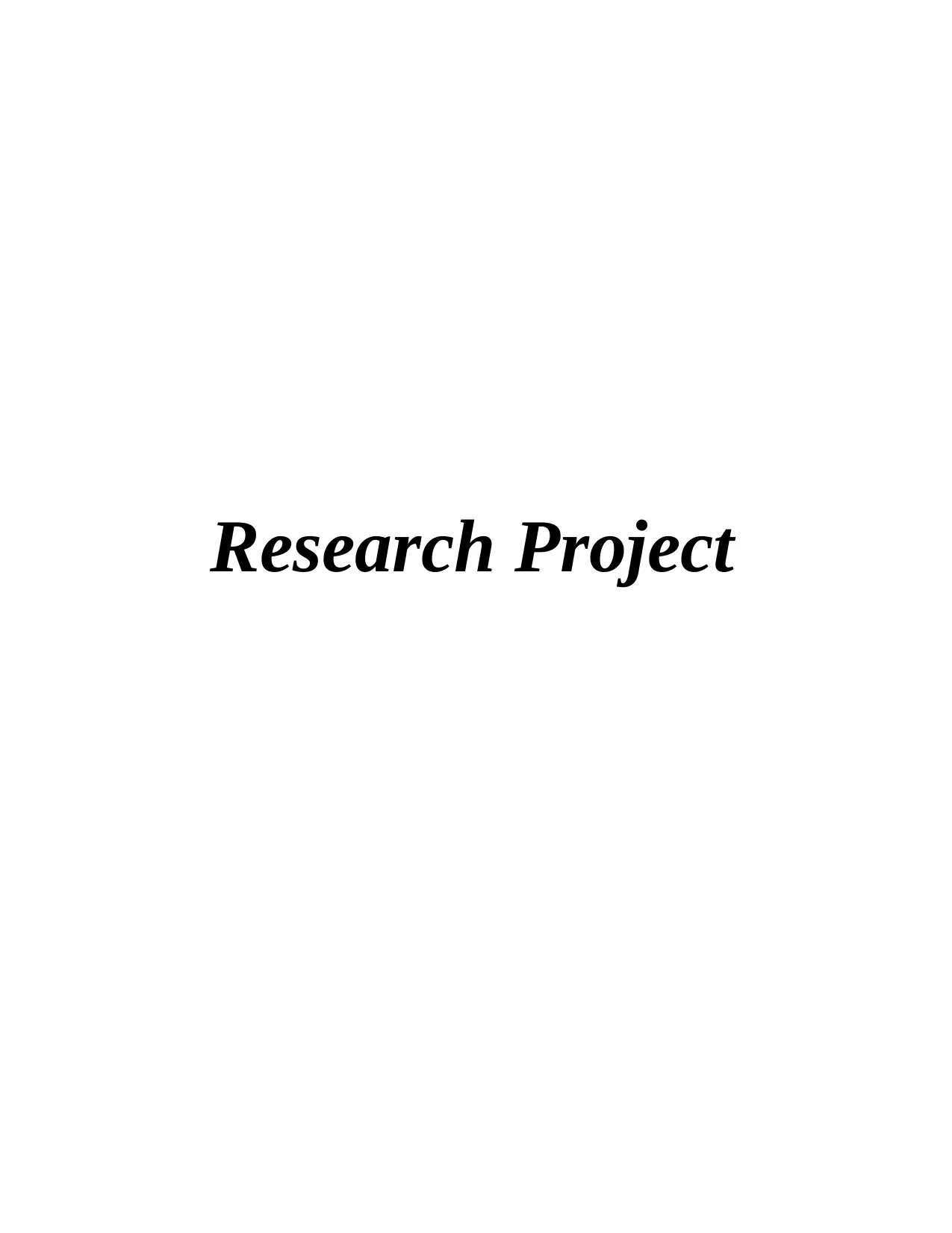
Research Project
Paraphrase This Document
Need a fresh take? Get an instant paraphrase of this document with our AI Paraphraser
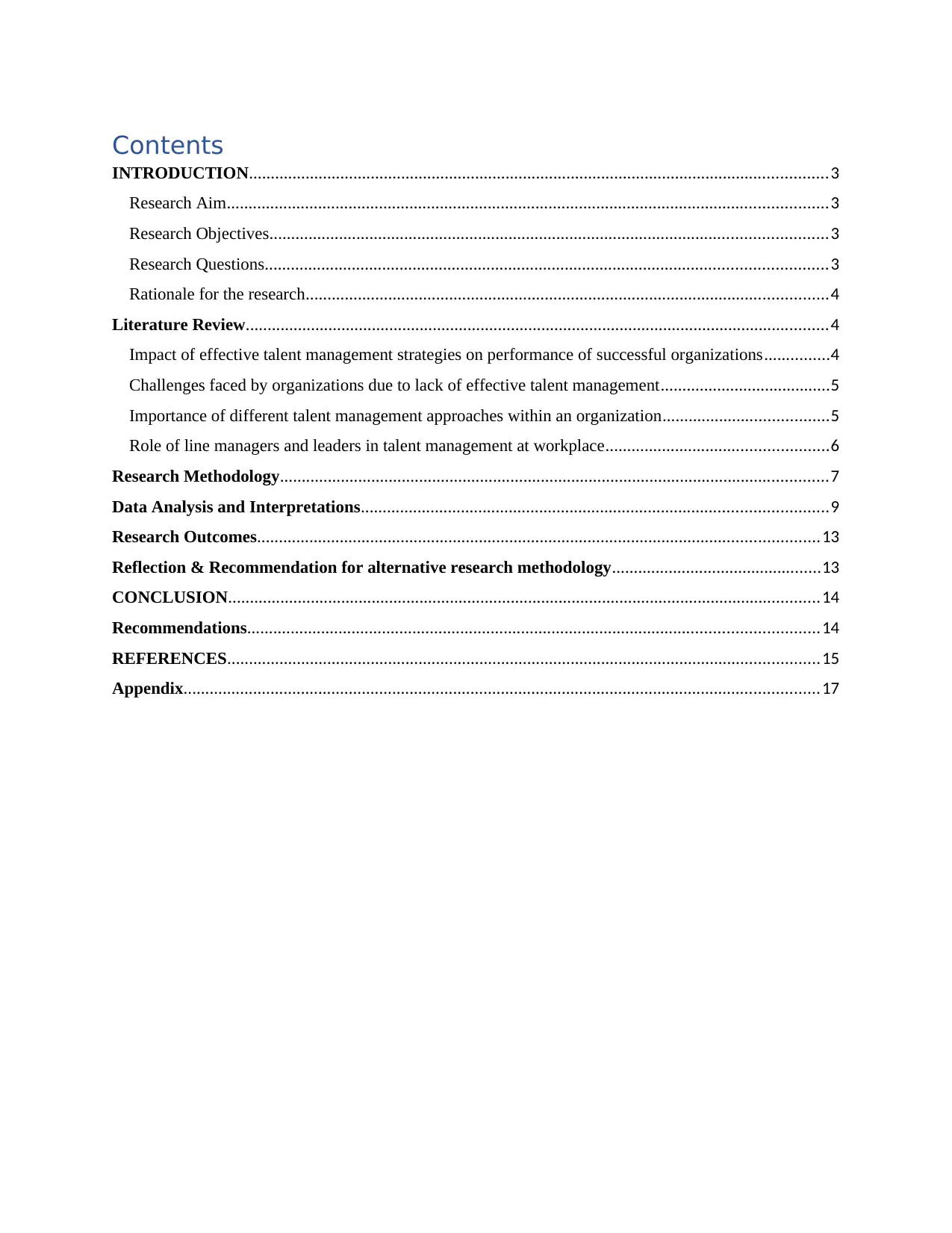
Contents
INTRODUCTION.....................................................................................................................................3
Research Aim..........................................................................................................................................3
Research Objectives................................................................................................................................3
Research Questions.................................................................................................................................3
Rationale for the research........................................................................................................................4
Literature Review......................................................................................................................................4
Impact of effective talent management strategies on performance of successful organizations...............4
Challenges faced by organizations due to lack of effective talent management.......................................5
Importance of different talent management approaches within an organization......................................5
Role of line managers and leaders in talent management at workplace...................................................6
Research Methodology..............................................................................................................................7
Data Analysis and Interpretations...........................................................................................................9
Research Outcomes.................................................................................................................................13
Reflection & Recommendation for alternative research methodology................................................13
CONCLUSION........................................................................................................................................14
Recommendations...................................................................................................................................14
REFERENCES........................................................................................................................................15
Appendix..................................................................................................................................................17
INTRODUCTION.....................................................................................................................................3
Research Aim..........................................................................................................................................3
Research Objectives................................................................................................................................3
Research Questions.................................................................................................................................3
Rationale for the research........................................................................................................................4
Literature Review......................................................................................................................................4
Impact of effective talent management strategies on performance of successful organizations...............4
Challenges faced by organizations due to lack of effective talent management.......................................5
Importance of different talent management approaches within an organization......................................5
Role of line managers and leaders in talent management at workplace...................................................6
Research Methodology..............................................................................................................................7
Data Analysis and Interpretations...........................................................................................................9
Research Outcomes.................................................................................................................................13
Reflection & Recommendation for alternative research methodology................................................13
CONCLUSION........................................................................................................................................14
Recommendations...................................................................................................................................14
REFERENCES........................................................................................................................................15
Appendix..................................................................................................................................................17
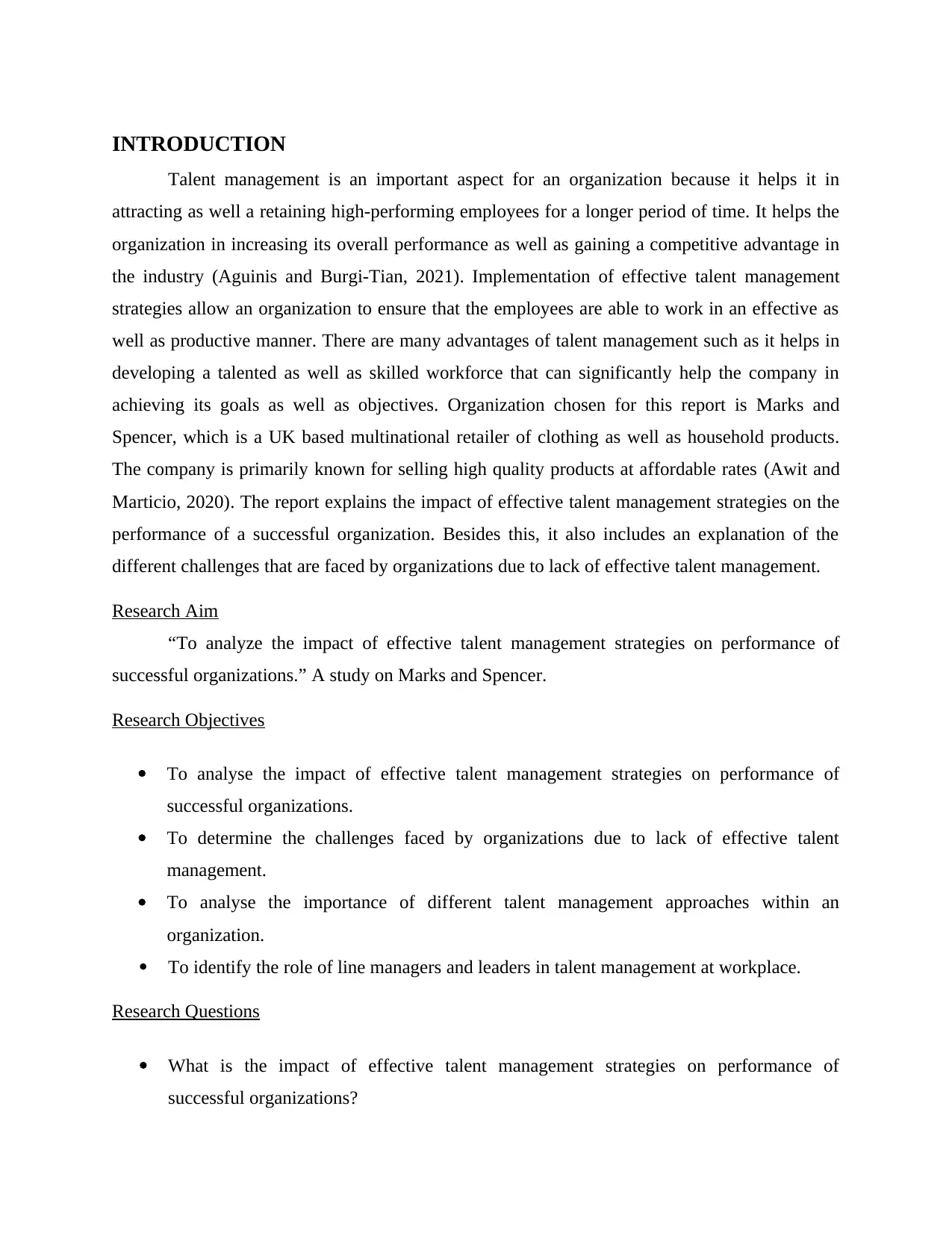
INTRODUCTION
Talent management is an important aspect for an organization because it helps it in
attracting as well a retaining high-performing employees for a longer period of time. It helps the
organization in increasing its overall performance as well as gaining a competitive advantage in
the industry (Aguinis and Burgi-Tian, 2021). Implementation of effective talent management
strategies allow an organization to ensure that the employees are able to work in an effective as
well as productive manner. There are many advantages of talent management such as it helps in
developing a talented as well as skilled workforce that can significantly help the company in
achieving its goals as well as objectives. Organization chosen for this report is Marks and
Spencer, which is a UK based multinational retailer of clothing as well as household products.
The company is primarily known for selling high quality products at affordable rates (Awit and
Marticio, 2020). The report explains the impact of effective talent management strategies on the
performance of a successful organization. Besides this, it also includes an explanation of the
different challenges that are faced by organizations due to lack of effective talent management.
Research Aim
“To analyze the impact of effective talent management strategies on performance of
successful organizations.” A study on Marks and Spencer.
Research Objectives
To analyse the impact of effective talent management strategies on performance of
successful organizations.
To determine the challenges faced by organizations due to lack of effective talent
management.
To analyse the importance of different talent management approaches within an
organization.
To identify the role of line managers and leaders in talent management at workplace.
Research Questions
What is the impact of effective talent management strategies on performance of
successful organizations?
Talent management is an important aspect for an organization because it helps it in
attracting as well a retaining high-performing employees for a longer period of time. It helps the
organization in increasing its overall performance as well as gaining a competitive advantage in
the industry (Aguinis and Burgi-Tian, 2021). Implementation of effective talent management
strategies allow an organization to ensure that the employees are able to work in an effective as
well as productive manner. There are many advantages of talent management such as it helps in
developing a talented as well as skilled workforce that can significantly help the company in
achieving its goals as well as objectives. Organization chosen for this report is Marks and
Spencer, which is a UK based multinational retailer of clothing as well as household products.
The company is primarily known for selling high quality products at affordable rates (Awit and
Marticio, 2020). The report explains the impact of effective talent management strategies on the
performance of a successful organization. Besides this, it also includes an explanation of the
different challenges that are faced by organizations due to lack of effective talent management.
Research Aim
“To analyze the impact of effective talent management strategies on performance of
successful organizations.” A study on Marks and Spencer.
Research Objectives
To analyse the impact of effective talent management strategies on performance of
successful organizations.
To determine the challenges faced by organizations due to lack of effective talent
management.
To analyse the importance of different talent management approaches within an
organization.
To identify the role of line managers and leaders in talent management at workplace.
Research Questions
What is the impact of effective talent management strategies on performance of
successful organizations?
⊘ This is a preview!⊘
Do you want full access?
Subscribe today to unlock all pages.

Trusted by 1+ million students worldwide
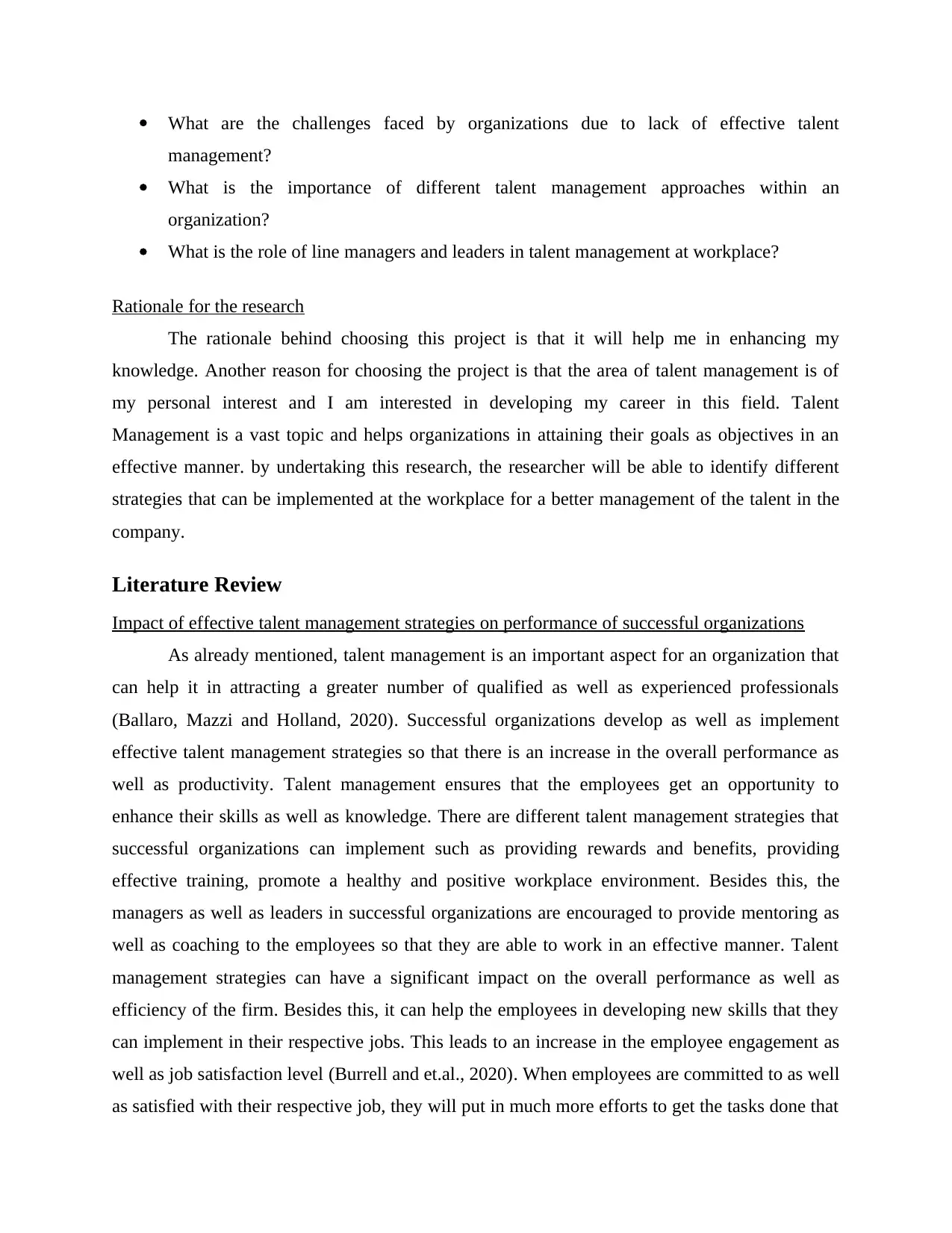
What are the challenges faced by organizations due to lack of effective talent
management?
What is the importance of different talent management approaches within an
organization?
What is the role of line managers and leaders in talent management at workplace?
Rationale for the research
The rationale behind choosing this project is that it will help me in enhancing my
knowledge. Another reason for choosing the project is that the area of talent management is of
my personal interest and I am interested in developing my career in this field. Talent
Management is a vast topic and helps organizations in attaining their goals as objectives in an
effective manner. by undertaking this research, the researcher will be able to identify different
strategies that can be implemented at the workplace for a better management of the talent in the
company.
Literature Review
Impact of effective talent management strategies on performance of successful organizations
As already mentioned, talent management is an important aspect for an organization that
can help it in attracting a greater number of qualified as well as experienced professionals
(Ballaro, Mazzi and Holland, 2020). Successful organizations develop as well as implement
effective talent management strategies so that there is an increase in the overall performance as
well as productivity. Talent management ensures that the employees get an opportunity to
enhance their skills as well as knowledge. There are different talent management strategies that
successful organizations can implement such as providing rewards and benefits, providing
effective training, promote a healthy and positive workplace environment. Besides this, the
managers as well as leaders in successful organizations are encouraged to provide mentoring as
well as coaching to the employees so that they are able to work in an effective manner. Talent
management strategies can have a significant impact on the overall performance as well as
efficiency of the firm. Besides this, it can help the employees in developing new skills that they
can implement in their respective jobs. This leads to an increase in the employee engagement as
well as job satisfaction level (Burrell and et.al., 2020). When employees are committed to as well
as satisfied with their respective job, they will put in much more efforts to get the tasks done that
management?
What is the importance of different talent management approaches within an
organization?
What is the role of line managers and leaders in talent management at workplace?
Rationale for the research
The rationale behind choosing this project is that it will help me in enhancing my
knowledge. Another reason for choosing the project is that the area of talent management is of
my personal interest and I am interested in developing my career in this field. Talent
Management is a vast topic and helps organizations in attaining their goals as objectives in an
effective manner. by undertaking this research, the researcher will be able to identify different
strategies that can be implemented at the workplace for a better management of the talent in the
company.
Literature Review
Impact of effective talent management strategies on performance of successful organizations
As already mentioned, talent management is an important aspect for an organization that
can help it in attracting a greater number of qualified as well as experienced professionals
(Ballaro, Mazzi and Holland, 2020). Successful organizations develop as well as implement
effective talent management strategies so that there is an increase in the overall performance as
well as productivity. Talent management ensures that the employees get an opportunity to
enhance their skills as well as knowledge. There are different talent management strategies that
successful organizations can implement such as providing rewards and benefits, providing
effective training, promote a healthy and positive workplace environment. Besides this, the
managers as well as leaders in successful organizations are encouraged to provide mentoring as
well as coaching to the employees so that they are able to work in an effective manner. Talent
management strategies can have a significant impact on the overall performance as well as
efficiency of the firm. Besides this, it can help the employees in developing new skills that they
can implement in their respective jobs. This leads to an increase in the employee engagement as
well as job satisfaction level (Burrell and et.al., 2020). When employees are committed to as well
as satisfied with their respective job, they will put in much more efforts to get the tasks done that
Paraphrase This Document
Need a fresh take? Get an instant paraphrase of this document with our AI Paraphraser
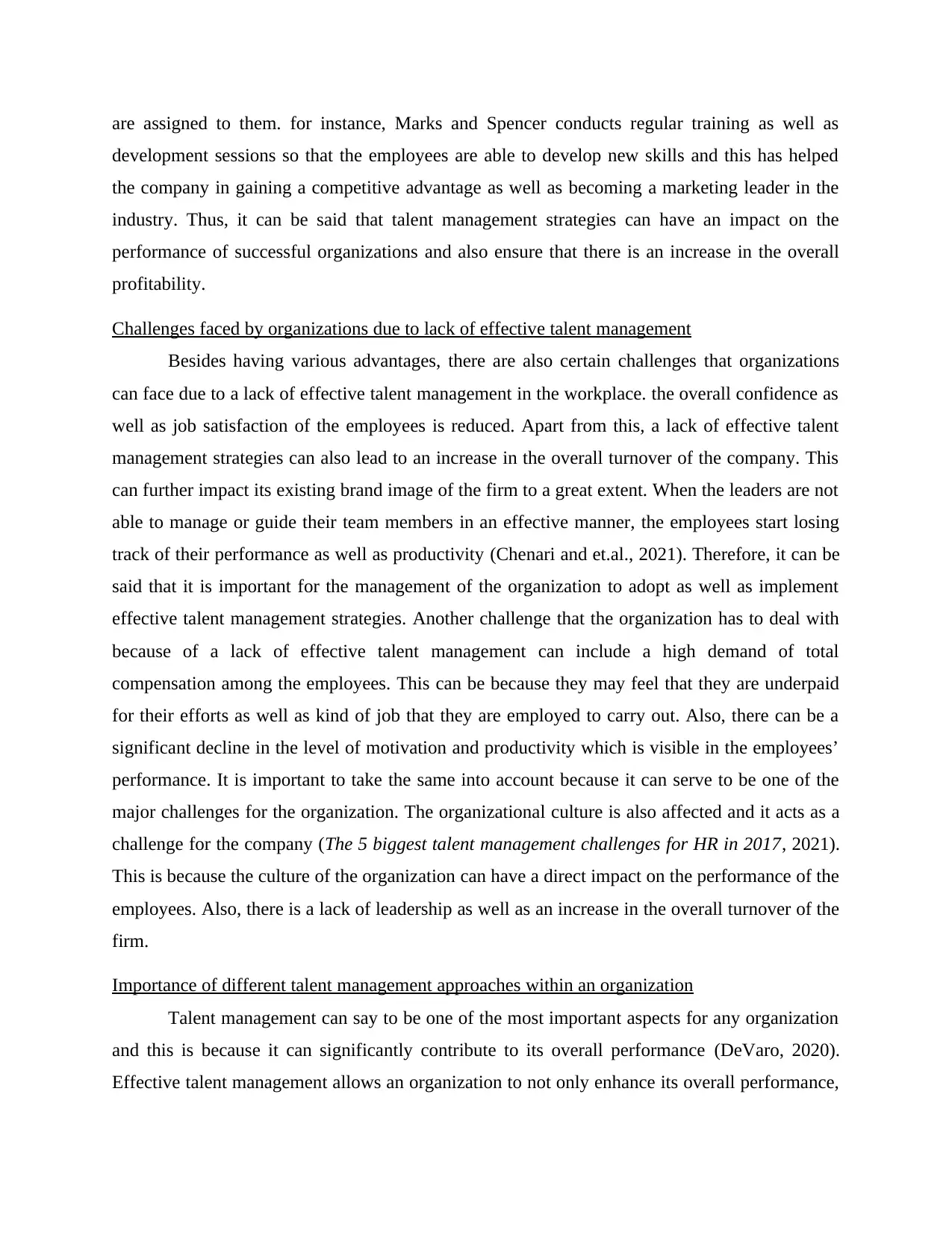
are assigned to them. for instance, Marks and Spencer conducts regular training as well as
development sessions so that the employees are able to develop new skills and this has helped
the company in gaining a competitive advantage as well as becoming a marketing leader in the
industry. Thus, it can be said that talent management strategies can have an impact on the
performance of successful organizations and also ensure that there is an increase in the overall
profitability.
Challenges faced by organizations due to lack of effective talent management
Besides having various advantages, there are also certain challenges that organizations
can face due to a lack of effective talent management in the workplace. the overall confidence as
well as job satisfaction of the employees is reduced. Apart from this, a lack of effective talent
management strategies can also lead to an increase in the overall turnover of the company. This
can further impact its existing brand image of the firm to a great extent. When the leaders are not
able to manage or guide their team members in an effective manner, the employees start losing
track of their performance as well as productivity (Chenari and et.al., 2021). Therefore, it can be
said that it is important for the management of the organization to adopt as well as implement
effective talent management strategies. Another challenge that the organization has to deal with
because of a lack of effective talent management can include a high demand of total
compensation among the employees. This can be because they may feel that they are underpaid
for their efforts as well as kind of job that they are employed to carry out. Also, there can be a
significant decline in the level of motivation and productivity which is visible in the employees’
performance. It is important to take the same into account because it can serve to be one of the
major challenges for the organization. The organizational culture is also affected and it acts as a
challenge for the company (The 5 biggest talent management challenges for HR in 2017, 2021).
This is because the culture of the organization can have a direct impact on the performance of the
employees. Also, there is a lack of leadership as well as an increase in the overall turnover of the
firm.
Importance of different talent management approaches within an organization
Talent management can say to be one of the most important aspects for any organization
and this is because it can significantly contribute to its overall performance (DeVaro, 2020).
Effective talent management allows an organization to not only enhance its overall performance,
development sessions so that the employees are able to develop new skills and this has helped
the company in gaining a competitive advantage as well as becoming a marketing leader in the
industry. Thus, it can be said that talent management strategies can have an impact on the
performance of successful organizations and also ensure that there is an increase in the overall
profitability.
Challenges faced by organizations due to lack of effective talent management
Besides having various advantages, there are also certain challenges that organizations
can face due to a lack of effective talent management in the workplace. the overall confidence as
well as job satisfaction of the employees is reduced. Apart from this, a lack of effective talent
management strategies can also lead to an increase in the overall turnover of the company. This
can further impact its existing brand image of the firm to a great extent. When the leaders are not
able to manage or guide their team members in an effective manner, the employees start losing
track of their performance as well as productivity (Chenari and et.al., 2021). Therefore, it can be
said that it is important for the management of the organization to adopt as well as implement
effective talent management strategies. Another challenge that the organization has to deal with
because of a lack of effective talent management can include a high demand of total
compensation among the employees. This can be because they may feel that they are underpaid
for their efforts as well as kind of job that they are employed to carry out. Also, there can be a
significant decline in the level of motivation and productivity which is visible in the employees’
performance. It is important to take the same into account because it can serve to be one of the
major challenges for the organization. The organizational culture is also affected and it acts as a
challenge for the company (The 5 biggest talent management challenges for HR in 2017, 2021).
This is because the culture of the organization can have a direct impact on the performance of the
employees. Also, there is a lack of leadership as well as an increase in the overall turnover of the
firm.
Importance of different talent management approaches within an organization
Talent management can say to be one of the most important aspects for any organization
and this is because it can significantly contribute to its overall performance (DeVaro, 2020).
Effective talent management allows an organization to not only enhance its overall performance,
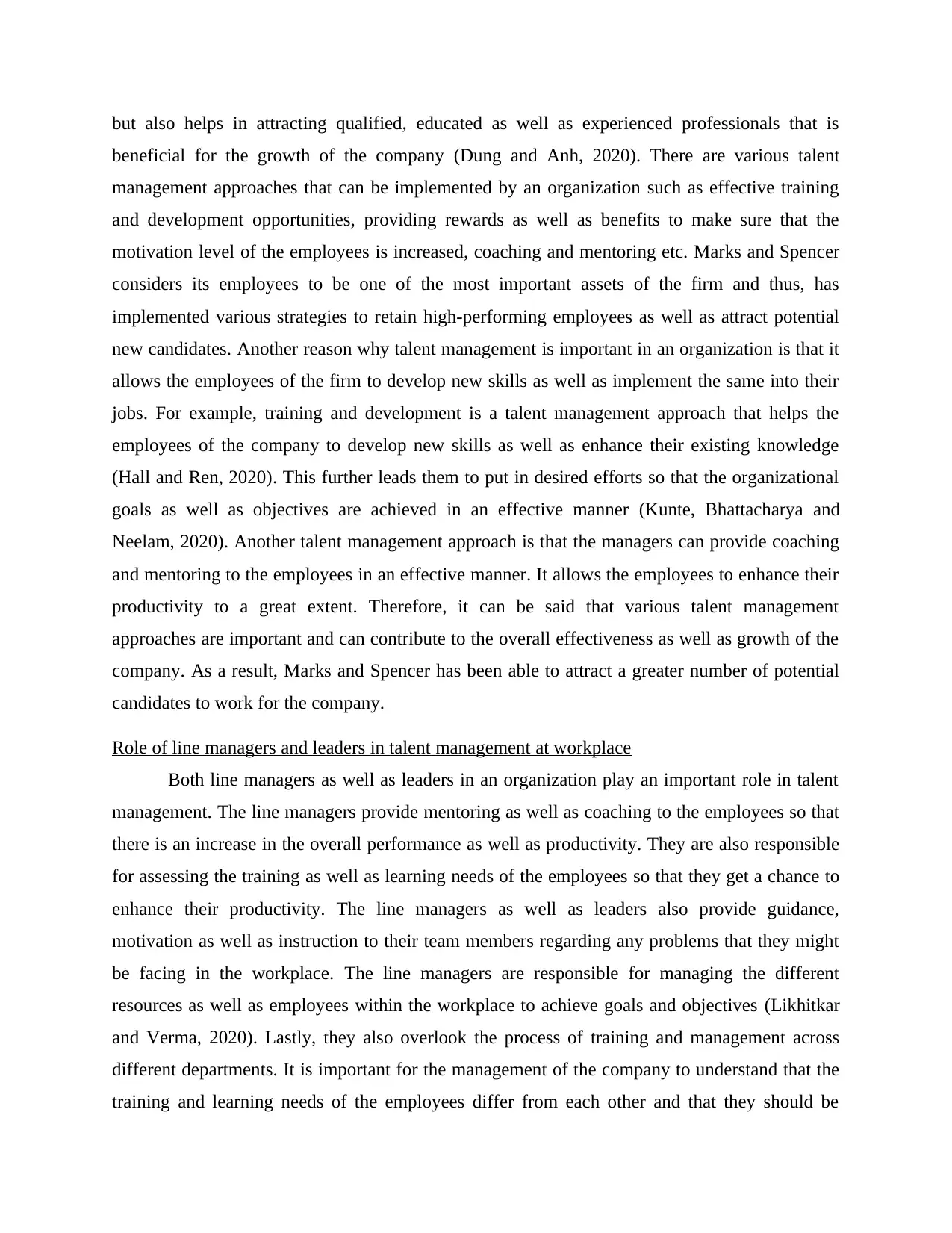
but also helps in attracting qualified, educated as well as experienced professionals that is
beneficial for the growth of the company (Dung and Anh, 2020). There are various talent
management approaches that can be implemented by an organization such as effective training
and development opportunities, providing rewards as well as benefits to make sure that the
motivation level of the employees is increased, coaching and mentoring etc. Marks and Spencer
considers its employees to be one of the most important assets of the firm and thus, has
implemented various strategies to retain high-performing employees as well as attract potential
new candidates. Another reason why talent management is important in an organization is that it
allows the employees of the firm to develop new skills as well as implement the same into their
jobs. For example, training and development is a talent management approach that helps the
employees of the company to develop new skills as well as enhance their existing knowledge
(Hall and Ren, 2020). This further leads them to put in desired efforts so that the organizational
goals as well as objectives are achieved in an effective manner (Kunte, Bhattacharya and
Neelam, 2020). Another talent management approach is that the managers can provide coaching
and mentoring to the employees in an effective manner. It allows the employees to enhance their
productivity to a great extent. Therefore, it can be said that various talent management
approaches are important and can contribute to the overall effectiveness as well as growth of the
company. As a result, Marks and Spencer has been able to attract a greater number of potential
candidates to work for the company.
Role of line managers and leaders in talent management at workplace
Both line managers as well as leaders in an organization play an important role in talent
management. The line managers provide mentoring as well as coaching to the employees so that
there is an increase in the overall performance as well as productivity. They are also responsible
for assessing the training as well as learning needs of the employees so that they get a chance to
enhance their productivity. The line managers as well as leaders also provide guidance,
motivation as well as instruction to their team members regarding any problems that they might
be facing in the workplace. The line managers are responsible for managing the different
resources as well as employees within the workplace to achieve goals and objectives (Likhitkar
and Verma, 2020). Lastly, they also overlook the process of training and management across
different departments. It is important for the management of the company to understand that the
training and learning needs of the employees differ from each other and that they should be
beneficial for the growth of the company (Dung and Anh, 2020). There are various talent
management approaches that can be implemented by an organization such as effective training
and development opportunities, providing rewards as well as benefits to make sure that the
motivation level of the employees is increased, coaching and mentoring etc. Marks and Spencer
considers its employees to be one of the most important assets of the firm and thus, has
implemented various strategies to retain high-performing employees as well as attract potential
new candidates. Another reason why talent management is important in an organization is that it
allows the employees of the firm to develop new skills as well as implement the same into their
jobs. For example, training and development is a talent management approach that helps the
employees of the company to develop new skills as well as enhance their existing knowledge
(Hall and Ren, 2020). This further leads them to put in desired efforts so that the organizational
goals as well as objectives are achieved in an effective manner (Kunte, Bhattacharya and
Neelam, 2020). Another talent management approach is that the managers can provide coaching
and mentoring to the employees in an effective manner. It allows the employees to enhance their
productivity to a great extent. Therefore, it can be said that various talent management
approaches are important and can contribute to the overall effectiveness as well as growth of the
company. As a result, Marks and Spencer has been able to attract a greater number of potential
candidates to work for the company.
Role of line managers and leaders in talent management at workplace
Both line managers as well as leaders in an organization play an important role in talent
management. The line managers provide mentoring as well as coaching to the employees so that
there is an increase in the overall performance as well as productivity. They are also responsible
for assessing the training as well as learning needs of the employees so that they get a chance to
enhance their productivity. The line managers as well as leaders also provide guidance,
motivation as well as instruction to their team members regarding any problems that they might
be facing in the workplace. The line managers are responsible for managing the different
resources as well as employees within the workplace to achieve goals and objectives (Likhitkar
and Verma, 2020). Lastly, they also overlook the process of training and management across
different departments. It is important for the management of the company to understand that the
training and learning needs of the employees differ from each other and that they should be
⊘ This is a preview!⊘
Do you want full access?
Subscribe today to unlock all pages.

Trusted by 1+ million students worldwide
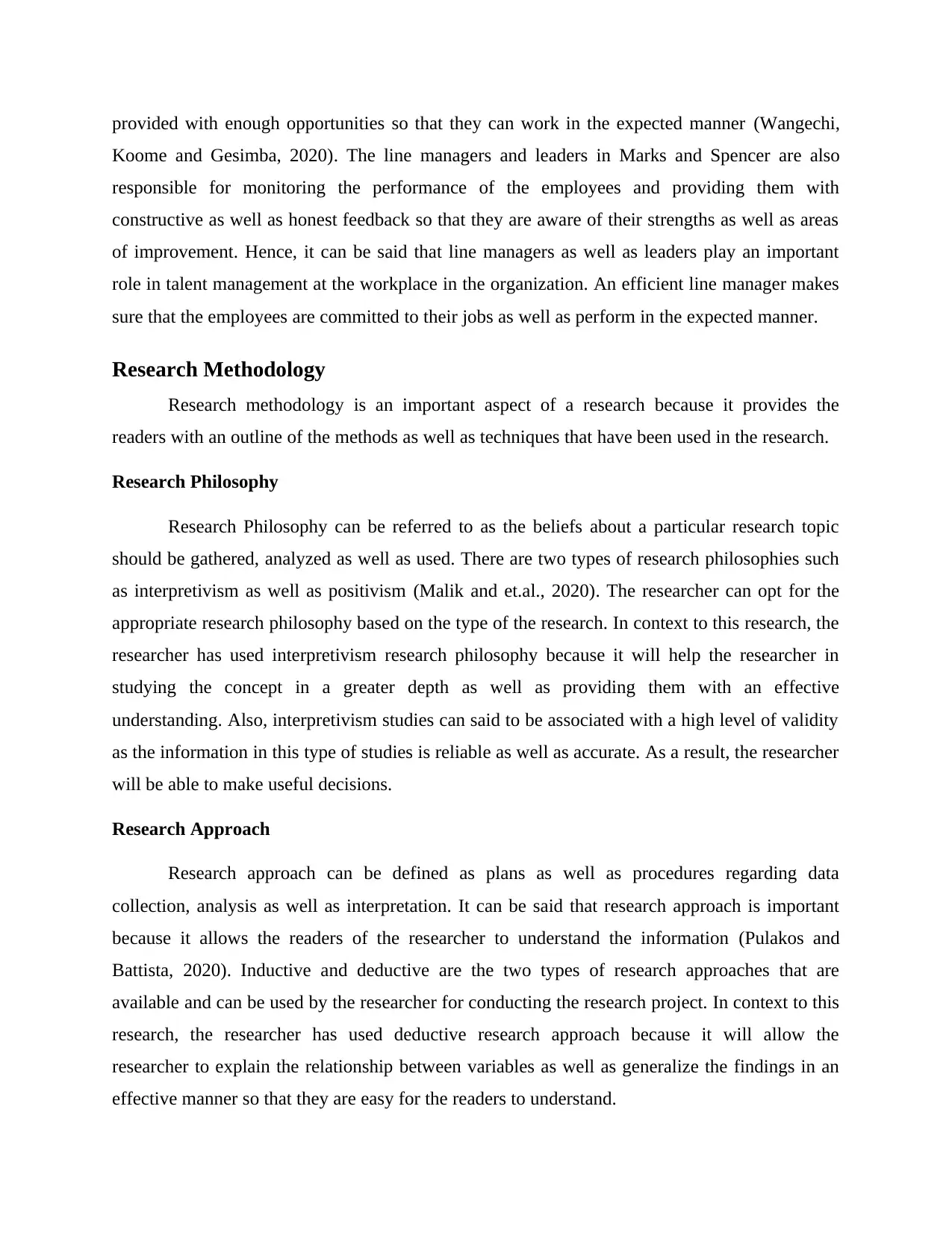
provided with enough opportunities so that they can work in the expected manner (Wangechi,
Koome and Gesimba, 2020). The line managers and leaders in Marks and Spencer are also
responsible for monitoring the performance of the employees and providing them with
constructive as well as honest feedback so that they are aware of their strengths as well as areas
of improvement. Hence, it can be said that line managers as well as leaders play an important
role in talent management at the workplace in the organization. An efficient line manager makes
sure that the employees are committed to their jobs as well as perform in the expected manner.
Research Methodology
Research methodology is an important aspect of a research because it provides the
readers with an outline of the methods as well as techniques that have been used in the research.
Research Philosophy
Research Philosophy can be referred to as the beliefs about a particular research topic
should be gathered, analyzed as well as used. There are two types of research philosophies such
as interpretivism as well as positivism (Malik and et.al., 2020). The researcher can opt for the
appropriate research philosophy based on the type of the research. In context to this research, the
researcher has used interpretivism research philosophy because it will help the researcher in
studying the concept in a greater depth as well as providing them with an effective
understanding. Also, interpretivism studies can said to be associated with a high level of validity
as the information in this type of studies is reliable as well as accurate. As a result, the researcher
will be able to make useful decisions.
Research Approach
Research approach can be defined as plans as well as procedures regarding data
collection, analysis as well as interpretation. It can be said that research approach is important
because it allows the readers of the researcher to understand the information (Pulakos and
Battista, 2020). Inductive and deductive are the two types of research approaches that are
available and can be used by the researcher for conducting the research project. In context to this
research, the researcher has used deductive research approach because it will allow the
researcher to explain the relationship between variables as well as generalize the findings in an
effective manner so that they are easy for the readers to understand.
Koome and Gesimba, 2020). The line managers and leaders in Marks and Spencer are also
responsible for monitoring the performance of the employees and providing them with
constructive as well as honest feedback so that they are aware of their strengths as well as areas
of improvement. Hence, it can be said that line managers as well as leaders play an important
role in talent management at the workplace in the organization. An efficient line manager makes
sure that the employees are committed to their jobs as well as perform in the expected manner.
Research Methodology
Research methodology is an important aspect of a research because it provides the
readers with an outline of the methods as well as techniques that have been used in the research.
Research Philosophy
Research Philosophy can be referred to as the beliefs about a particular research topic
should be gathered, analyzed as well as used. There are two types of research philosophies such
as interpretivism as well as positivism (Malik and et.al., 2020). The researcher can opt for the
appropriate research philosophy based on the type of the research. In context to this research, the
researcher has used interpretivism research philosophy because it will help the researcher in
studying the concept in a greater depth as well as providing them with an effective
understanding. Also, interpretivism studies can said to be associated with a high level of validity
as the information in this type of studies is reliable as well as accurate. As a result, the researcher
will be able to make useful decisions.
Research Approach
Research approach can be defined as plans as well as procedures regarding data
collection, analysis as well as interpretation. It can be said that research approach is important
because it allows the readers of the researcher to understand the information (Pulakos and
Battista, 2020). Inductive and deductive are the two types of research approaches that are
available and can be used by the researcher for conducting the research project. In context to this
research, the researcher has used deductive research approach because it will allow the
researcher to explain the relationship between variables as well as generalize the findings in an
effective manner so that they are easy for the readers to understand.
Paraphrase This Document
Need a fresh take? Get an instant paraphrase of this document with our AI Paraphraser
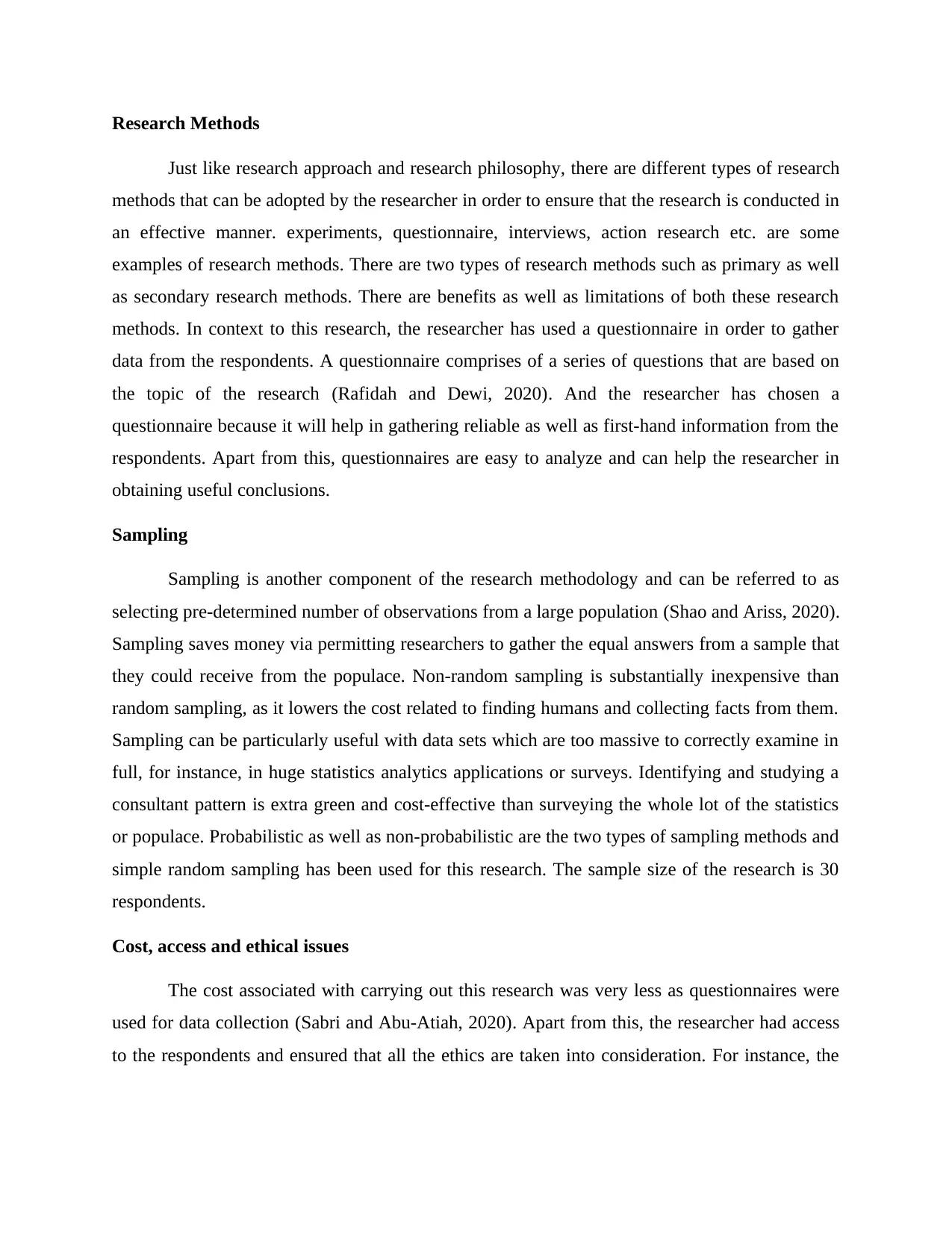
Research Methods
Just like research approach and research philosophy, there are different types of research
methods that can be adopted by the researcher in order to ensure that the research is conducted in
an effective manner. experiments, questionnaire, interviews, action research etc. are some
examples of research methods. There are two types of research methods such as primary as well
as secondary research methods. There are benefits as well as limitations of both these research
methods. In context to this research, the researcher has used a questionnaire in order to gather
data from the respondents. A questionnaire comprises of a series of questions that are based on
the topic of the research (Rafidah and Dewi, 2020). And the researcher has chosen a
questionnaire because it will help in gathering reliable as well as first-hand information from the
respondents. Apart from this, questionnaires are easy to analyze and can help the researcher in
obtaining useful conclusions.
Sampling
Sampling is another component of the research methodology and can be referred to as
selecting pre-determined number of observations from a large population (Shao and Ariss, 2020).
Sampling saves money via permitting researchers to gather the equal answers from a sample that
they could receive from the populace. Non-random sampling is substantially inexpensive than
random sampling, as it lowers the cost related to finding humans and collecting facts from them.
Sampling can be particularly useful with data sets which are too massive to correctly examine in
full, for instance, in huge statistics analytics applications or surveys. Identifying and studying a
consultant pattern is extra green and cost-effective than surveying the whole lot of the statistics
or populace. Probabilistic as well as non-probabilistic are the two types of sampling methods and
simple random sampling has been used for this research. The sample size of the research is 30
respondents.
Cost, access and ethical issues
The cost associated with carrying out this research was very less as questionnaires were
used for data collection (Sabri and Abu-Atiah, 2020). Apart from this, the researcher had access
to the respondents and ensured that all the ethics are taken into consideration. For instance, the
Just like research approach and research philosophy, there are different types of research
methods that can be adopted by the researcher in order to ensure that the research is conducted in
an effective manner. experiments, questionnaire, interviews, action research etc. are some
examples of research methods. There are two types of research methods such as primary as well
as secondary research methods. There are benefits as well as limitations of both these research
methods. In context to this research, the researcher has used a questionnaire in order to gather
data from the respondents. A questionnaire comprises of a series of questions that are based on
the topic of the research (Rafidah and Dewi, 2020). And the researcher has chosen a
questionnaire because it will help in gathering reliable as well as first-hand information from the
respondents. Apart from this, questionnaires are easy to analyze and can help the researcher in
obtaining useful conclusions.
Sampling
Sampling is another component of the research methodology and can be referred to as
selecting pre-determined number of observations from a large population (Shao and Ariss, 2020).
Sampling saves money via permitting researchers to gather the equal answers from a sample that
they could receive from the populace. Non-random sampling is substantially inexpensive than
random sampling, as it lowers the cost related to finding humans and collecting facts from them.
Sampling can be particularly useful with data sets which are too massive to correctly examine in
full, for instance, in huge statistics analytics applications or surveys. Identifying and studying a
consultant pattern is extra green and cost-effective than surveying the whole lot of the statistics
or populace. Probabilistic as well as non-probabilistic are the two types of sampling methods and
simple random sampling has been used for this research. The sample size of the research is 30
respondents.
Cost, access and ethical issues
The cost associated with carrying out this research was very less as questionnaires were
used for data collection (Sabri and Abu-Atiah, 2020). Apart from this, the researcher had access
to the respondents and ensured that all the ethics are taken into consideration. For instance, the
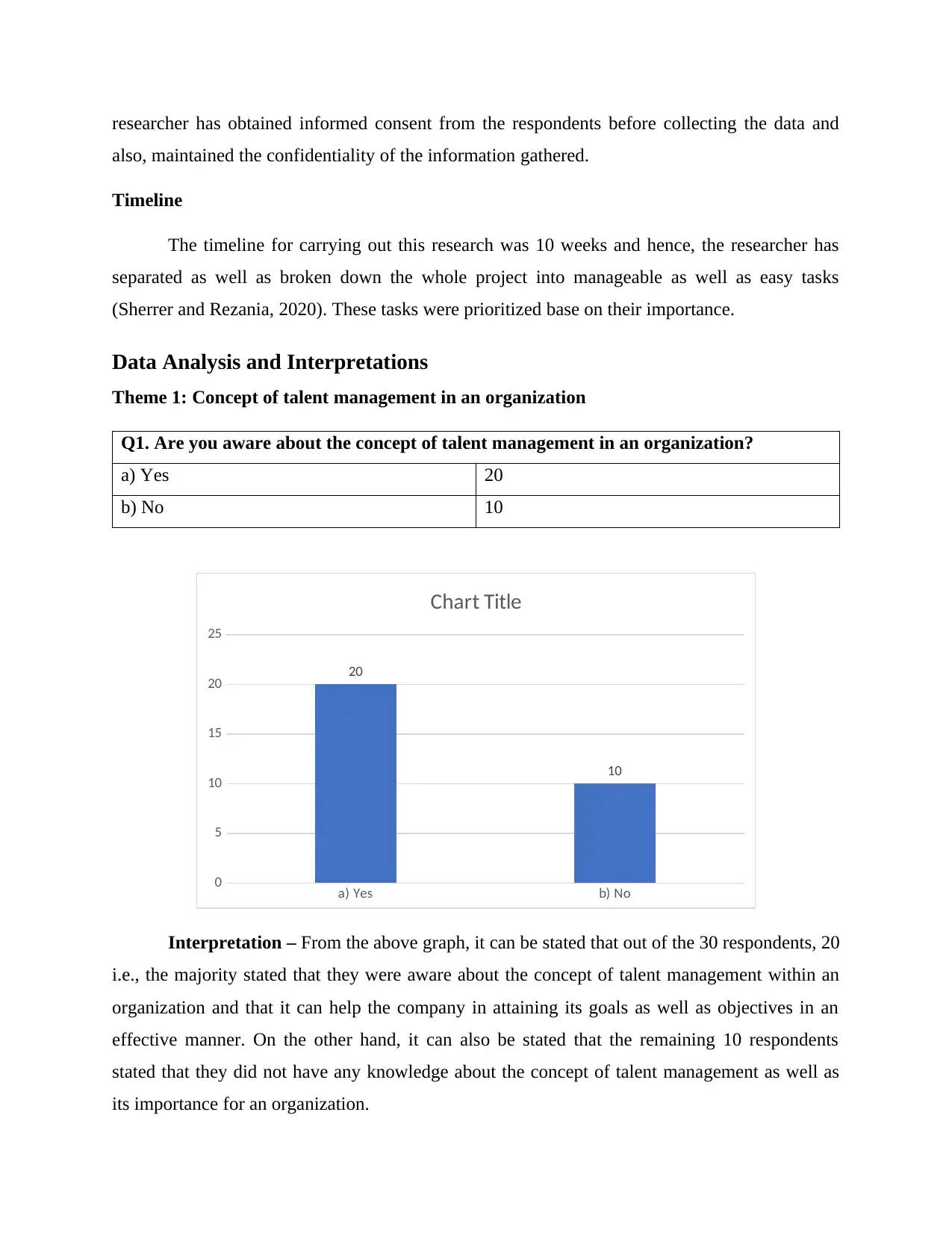
researcher has obtained informed consent from the respondents before collecting the data and
also, maintained the confidentiality of the information gathered.
Timeline
The timeline for carrying out this research was 10 weeks and hence, the researcher has
separated as well as broken down the whole project into manageable as well as easy tasks
(Sherrer and Rezania, 2020). These tasks were prioritized base on their importance.
Data Analysis and Interpretations
Theme 1: Concept of talent management in an organization
Q1. Are you aware about the concept of talent management in an organization?
a) Yes 20
b) No 10
a) Yes b) No
0
5
10
15
20
25
20
10
Chart Title
Interpretation – From the above graph, it can be stated that out of the 30 respondents, 20
i.e., the majority stated that they were aware about the concept of talent management within an
organization and that it can help the company in attaining its goals as well as objectives in an
effective manner. On the other hand, it can also be stated that the remaining 10 respondents
stated that they did not have any knowledge about the concept of talent management as well as
its importance for an organization.
also, maintained the confidentiality of the information gathered.
Timeline
The timeline for carrying out this research was 10 weeks and hence, the researcher has
separated as well as broken down the whole project into manageable as well as easy tasks
(Sherrer and Rezania, 2020). These tasks were prioritized base on their importance.
Data Analysis and Interpretations
Theme 1: Concept of talent management in an organization
Q1. Are you aware about the concept of talent management in an organization?
a) Yes 20
b) No 10
a) Yes b) No
0
5
10
15
20
25
20
10
Chart Title
Interpretation – From the above graph, it can be stated that out of the 30 respondents, 20
i.e., the majority stated that they were aware about the concept of talent management within an
organization and that it can help the company in attaining its goals as well as objectives in an
effective manner. On the other hand, it can also be stated that the remaining 10 respondents
stated that they did not have any knowledge about the concept of talent management as well as
its importance for an organization.
⊘ This is a preview!⊘
Do you want full access?
Subscribe today to unlock all pages.

Trusted by 1+ million students worldwide
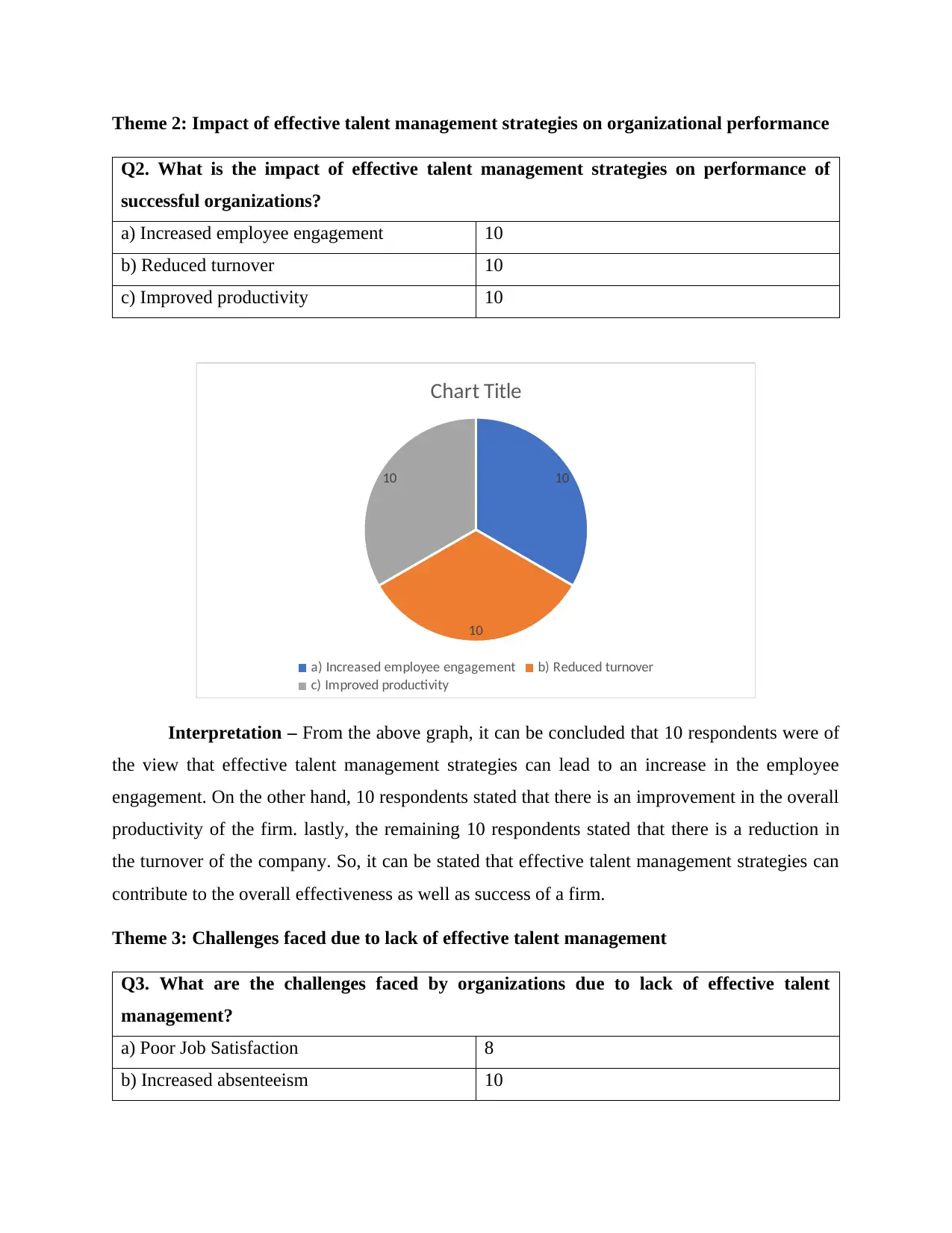
Theme 2: Impact of effective talent management strategies on organizational performance
Q2. What is the impact of effective talent management strategies on performance of
successful organizations?
a) Increased employee engagement 10
b) Reduced turnover 10
c) Improved productivity 10
10
10
10
Chart Title
a) Increased employee engagement b) Reduced turnover
c) Improved productivity
Interpretation – From the above graph, it can be concluded that 10 respondents were of
the view that effective talent management strategies can lead to an increase in the employee
engagement. On the other hand, 10 respondents stated that there is an improvement in the overall
productivity of the firm. lastly, the remaining 10 respondents stated that there is a reduction in
the turnover of the company. So, it can be stated that effective talent management strategies can
contribute to the overall effectiveness as well as success of a firm.
Theme 3: Challenges faced due to lack of effective talent management
Q3. What are the challenges faced by organizations due to lack of effective talent
management?
a) Poor Job Satisfaction 8
b) Increased absenteeism 10
Q2. What is the impact of effective talent management strategies on performance of
successful organizations?
a) Increased employee engagement 10
b) Reduced turnover 10
c) Improved productivity 10
10
10
10
Chart Title
a) Increased employee engagement b) Reduced turnover
c) Improved productivity
Interpretation – From the above graph, it can be concluded that 10 respondents were of
the view that effective talent management strategies can lead to an increase in the employee
engagement. On the other hand, 10 respondents stated that there is an improvement in the overall
productivity of the firm. lastly, the remaining 10 respondents stated that there is a reduction in
the turnover of the company. So, it can be stated that effective talent management strategies can
contribute to the overall effectiveness as well as success of a firm.
Theme 3: Challenges faced due to lack of effective talent management
Q3. What are the challenges faced by organizations due to lack of effective talent
management?
a) Poor Job Satisfaction 8
b) Increased absenteeism 10
Paraphrase This Document
Need a fresh take? Get an instant paraphrase of this document with our AI Paraphraser

c) Low morale 12
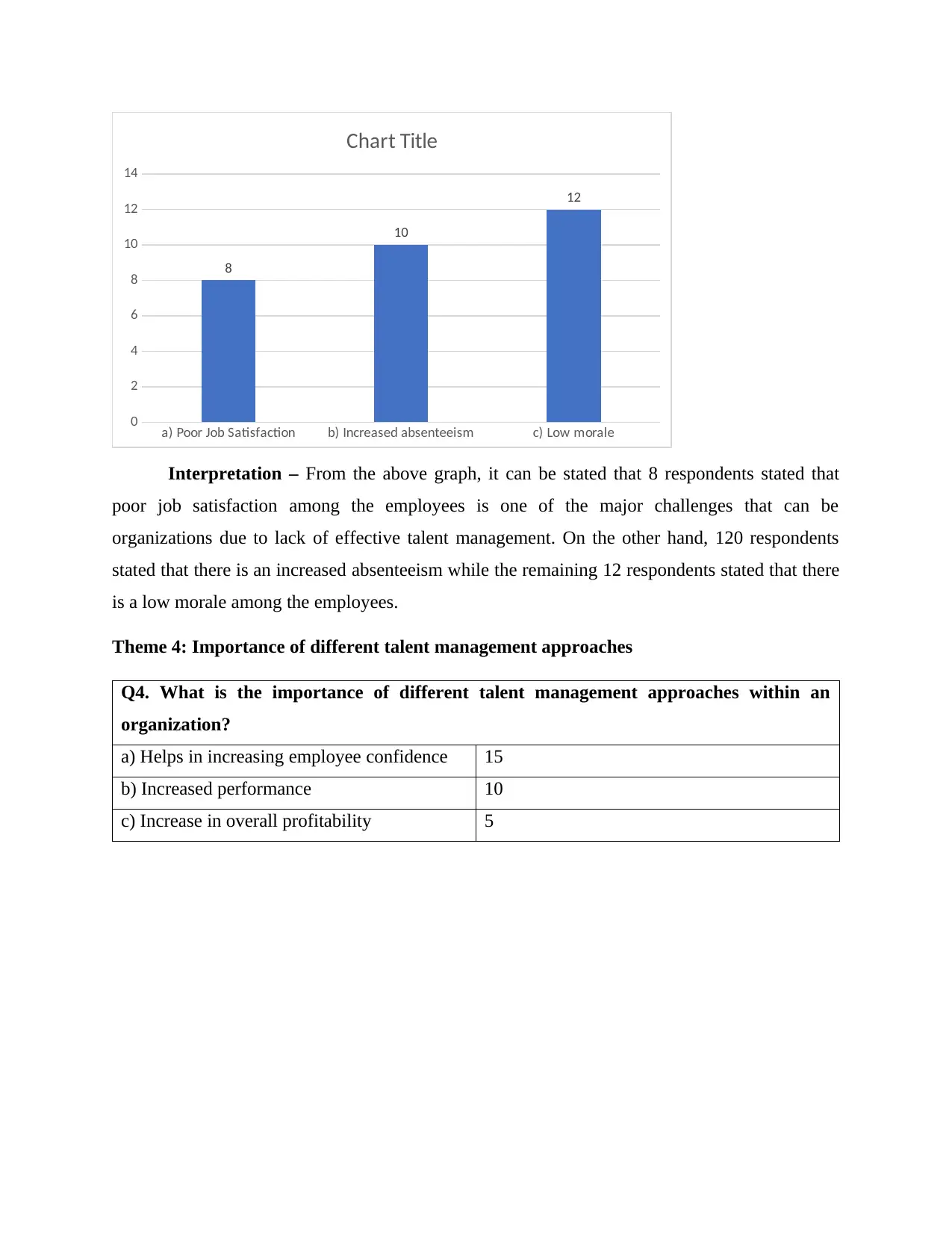
a) Poor Job Satisfaction b) Increased absenteeism c) Low morale
0
2
4
6
8
10
12
14
8
10
12
Chart Title
Interpretation – From the above graph, it can be stated that 8 respondents stated that
poor job satisfaction among the employees is one of the major challenges that can be
organizations due to lack of effective talent management. On the other hand, 120 respondents
stated that there is an increased absenteeism while the remaining 12 respondents stated that there
is a low morale among the employees.
Theme 4: Importance of different talent management approaches
Q4. What is the importance of different talent management approaches within an
organization?
a) Helps in increasing employee confidence 15
b) Increased performance 10
c) Increase in overall profitability 5
0
2
4
6
8
10
12
14
8
10
12
Chart Title
Interpretation – From the above graph, it can be stated that 8 respondents stated that
poor job satisfaction among the employees is one of the major challenges that can be
organizations due to lack of effective talent management. On the other hand, 120 respondents
stated that there is an increased absenteeism while the remaining 12 respondents stated that there
is a low morale among the employees.
Theme 4: Importance of different talent management approaches
Q4. What is the importance of different talent management approaches within an
organization?
a) Helps in increasing employee confidence 15
b) Increased performance 10
c) Increase in overall profitability 5
⊘ This is a preview!⊘
Do you want full access?
Subscribe today to unlock all pages.

Trusted by 1+ million students worldwide
1 out of 18
Related Documents
Your All-in-One AI-Powered Toolkit for Academic Success.
+13062052269
info@desklib.com
Available 24*7 on WhatsApp / Email
![[object Object]](/_next/static/media/star-bottom.7253800d.svg)
Unlock your academic potential
Copyright © 2020–2026 A2Z Services. All Rights Reserved. Developed and managed by ZUCOL.



